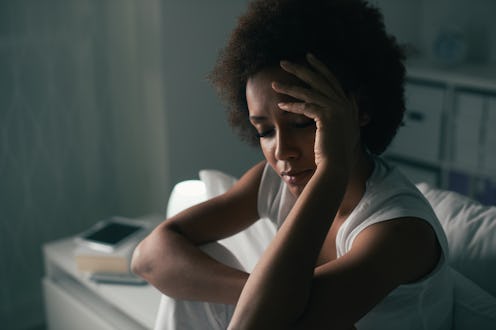Life
9 Ways To Beat Social Jet Lag This Holiday Season

The holidays are fast-approaching, which means your social calendar is probably starting to fill up. Friendsgivings, family get-togethers, work parties. It's fab to spend time with all the people you care about, but do you usually start to feel a little extra tired this time of year? Like, do you crave naps and budget for extra lattes?
That's because you're probably experiencing what's called social jet lag, which is very, very real. Social jet lag is basically when your body's internal clock doesn't match up with your daily life, according to a study published in Current Biology. The study found that people's sleep patterns change seasonally, not because of the change in sunlight, but because of changes in social schedules, such as school, work, and commuting schedules, according to the news release — much like the changes in schedules seen during the holidays as events and parties amp up.
Not only has social jet lag been found to make you more tired and cranky, but the American Academy of Sleep Medicine also found that social jet lag increases your risk of heart disease, according to a news release. Obviously you still want to enjoy all those holiday events as much as you can, so here are nine ways to help you beat social jet lag this holiday season.
1Unplug At Least 30 Minutes Before Bed
The blue light emitted by smartphones, tablets, and other electronic devices can mess with your circadian rhythm, The Chicago Tribune reports, making your social jet lag worse. And watching TV to help you fall asleep usually just keeps you awake, says The Chicago Tribune. It's best to just power down the electronics when it's time for bed.
2Turn Off Cell Phone Notifications
Use your phone's "do not disturb" feature to turn off unnecessary notifications, says The Center for Young Women's Health. That way, you don't wake up every time you get a new email or Facebook comment.
3Take Time To Wind Down
You might feel like watching TV or scrolling through your social media news feeds is helping you wind down, but it's actually stimulating your brain, says Loma Linda University. Instead, Loma Linda University recommends taking a bath, doing some gentle stretches, or some deep-breathing exercises instead.
4Get Up At The Same Time Every Day
The body's internal clock craves consistency, so you'll feel more rested over time if you stick to the same sleep schedule, according to North Carolina State University. That means even if you stayed out late for a party or work event, do your best to get up at your regular time the next morning — even on the weekends.
5Get Some Daily Activity
Even if it's just a 20-minute walk before or after work, getting some activity will help you get some better quality sleep that will help you offset social jet lag, according to The Sleep Advisor. Just make sure you don't do anything too physical right before you go to bed, says The Sleep Advisor, otherwise you'll end up having trouble falling asleep.
6Repay Your "Sleep Debt"
Rather than just sleeping in on the weekends, sleep psychologist Hope Bastine told Cosmopolitan you should go to bed one hour earlier and wake up one hour later. This way, you're "spreading out the repayment of your sleep debt" so you're "not changing your brain too much in terms of your habits," Bastine told Cosmopolitan.
7Try Not To Take Naps
Sometimes a power nap can help you get through the day, says the National Sleep Foundation. But if you're having trouble falling asleep because your sleep schedule is all off, The National Sleep Foundation recommends not taking any naps so you get your sleep schedule back on track.
8Pay Attention To Your Caffeine Intake
Caffeine doesn't affect everyone the same way, but if you know you're sensitive to caffeine, make sure you watch how how much you're consuming. The Sleep Advisor recommends tapering off your caffeine intake throughout the day or stopping entirely by about six hours before you plan to go to sleep.
9Embrace Your Sleep Quirks
Not everyone can just lie down and fall asleep. Some people have specific sleeping quirks that help them fall asleep, according to Reader's Digest. Some need certain music playing, some need white noise, some need to sleep in specific positions. Whatever your quirk is, embrace it and just go with it.
10
If you notice your sleep schedule is getting a little too off-track, it's perfectly OK to say no to an event, too. Self-care is all about knowing your boundaries, so just make sure you're taking care of yourself this holiday season.
This article was originally published on